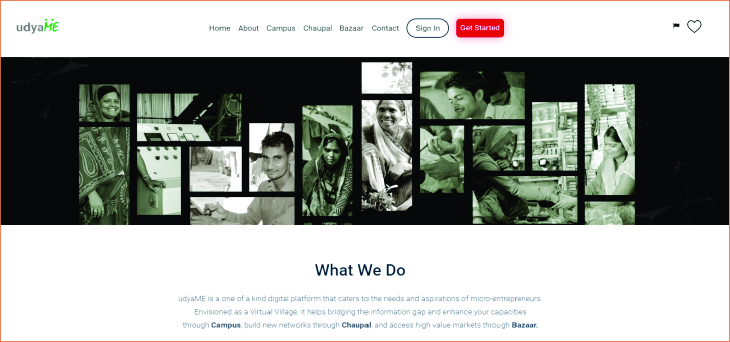Digital Platforms: Engines of
Change for Micro-Enterprises
The
emerging Indian economy is fuelled by a new wave of technology and market
transitions, as well as structural changes in the macro-economic
environment. One of the most important catalyst in this aspect are micro
enterprises. Micro enterprises are engines that boost job creation and fuel
sustainable economic development. As per the 73rd round of the National
Sample Survey (NSS), micro enterprises have created around 100 million jobs
and promoted industrialisation of rural and backward areas. Impetus to this
sector will have a significant multiplier effect on economic resilience and
social well-being.
Despite their crucial role and multiple schemes
by the government for them, micro-enterprises are one of the least serviced segments in India. The major reason behind the
same is scattered services which results in hassle for the entrepreneurs to
avail them. To access financial linkages or market linkages or technological
support, an entrepreneur has to go to multiple access points. This not only
creates chaos for him/her, but also leads to wastage of time and energy.
This roadblock coupled with information gap leads to a bigger problem of
unavailability of a ‘one stop solution’ for the entrepreneurs. Also to
accelerate the process of enterprise development, we need engines that can
create a convergence between the stakeholders, agencies and entrepreneurs to
scale up the output of creating efficient micro-enterprises. These
challenges make digital platforms and digital delivery models all the more
relevant. Through digital platforms (linked to information and communication
technology), the entrepreneurs can avail all support services at one place.
are one of the least serviced segments in India. The major reason behind the
same is scattered services which results in hassle for the entrepreneurs to
avail them. To access financial linkages or market linkages or technological
support, an entrepreneur has to go to multiple access points. This not only
creates chaos for him/her, but also leads to wastage of time and energy.
This roadblock coupled with information gap leads to a bigger problem of
unavailability of a ‘one stop solution’ for the entrepreneurs. Also to
accelerate the process of enterprise development, we need engines that can
create a convergence between the stakeholders, agencies and entrepreneurs to
scale up the output of creating efficient micro-enterprises. These
challenges make digital platforms and digital delivery models all the more
relevant. Through digital platforms (linked to information and communication
technology), the entrepreneurs can avail all support services at one place.
The digital platforms in this context can be websites and mobile apps that provide information and support services to the micro- entrepreneurs or facilities like Common Service Centres (CSCs) and Entrepreneur Helplines that leverage these platforms to deliver one stop solutions for them. These facilities not only save a lot of resources for entrepreneurs (in terms of time, money etc.) but also help them to optimise their operations. A more resource efficient business model supported by digital platforms has a higher chance of making an enterprise sustainable and creating more new jobs. However despite these efforts, there are multiple challenges which inhibit the propagation of digital services in India. These challenges include low digital literacy, low internet penetration, regulatory roadblocks for service providers to go online completely, lack of smartphones in the hands of women and marginalised sections of the society.

Keeping these challenges and opportunities in mind, Government of India, launched its ambitious initiative, Digital India campaign in July, 2015. This initiative was primarily started to ensure that all the government services are available to the citizens electronically by better digital infrastructure and increasing internet penetration across the country. On similar lines, through another initiative - Government E Marketplace (GEM), government is making its procurements online. Despite its multiple glitches, Digital India Scheme surely has some wins in its kitty, which include improved digital awareness, continuous improvement in digital infrastructure and the CSC initiatives. Improved world digital competitiveness rankings are just a minor indicator of the same. To transform India into a digital economy, government needs to build initiatives and create ecosystem keeping future trends in hindsight. Some of the key trends that can shape up micro-enterprise sector (which government should keep eye on) are as follows:
-
Power of information – India has more than 200 million smartphones and more than 550 million internet subscribers and they are growing really fast. This increasing penetration of Internet and affordable smartphones will lead to fast information flow. Access to relevant information will lead to more bargaining power, more choices to choose from, better operational efficiency and proper resource management - which will lead to creation of sustainable enterprises.
-
Cloud based data, accounting and enterprise management systems – Many start-ups are working on simplifying data, accounting & enterprise management for micro-entrepreneurs and developing affordable solutions by using cloud based technology. This initiative can enable enterprises to become more sustainable.
-
Virtual labour markets and co-working spaces - These spaces will help micro-entrepreneurs and job seekers to leverage new economic opportunities. Also since they are virtual, they will be economically viable and will reduce operational cost for the micro-enterprises.
-
The era of aggregation – Internet has immensely facilitated door step delivery of products and services. Taking this leap forward are aggregator businesses. These aggregators have business models coupled with technology that not only make customers’ lives easy, but also create new opportunities for huge number of micro-enterprises.
Development Alternatives (DA), in tandem with
the government’s vision, is working on creating digital platforms that
promote and support micro-entrepreneurship. Through its udyaME initiative,
it strives towards creating digital platforms that provides one stop
solution for micro-entrepreneurs. DA is also working towards developing
models like info-kiosk that can disseminate digital services in areas with
low or no digital infrastructures. It is also exploring how social
institutions (e.g. self-help group federations) in rural and semi-urban can
be transformed into change agents to bring digital transformation.
If India aims to nurture its micro enterprises and create them into
catalysts of socio-economic change, then it needs to equip them with digital
platforms and infrastructure. This will transform them into engines of
acceleration for achieving the country’s goal of 5 trillion economy. ■
Munir Ahmed Tahir
matahir@devalt.org